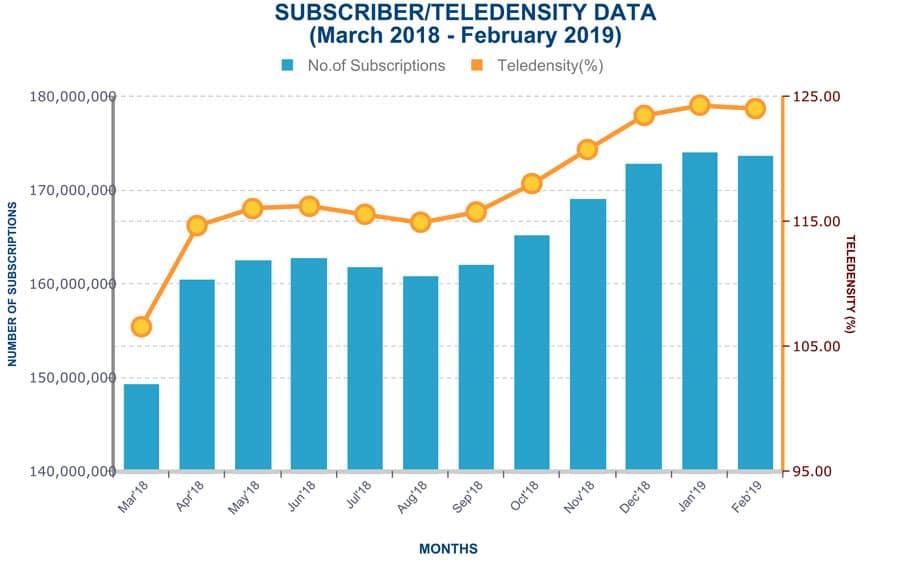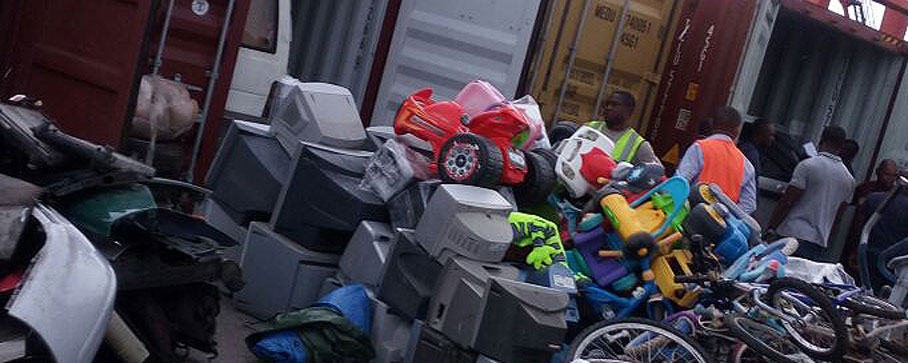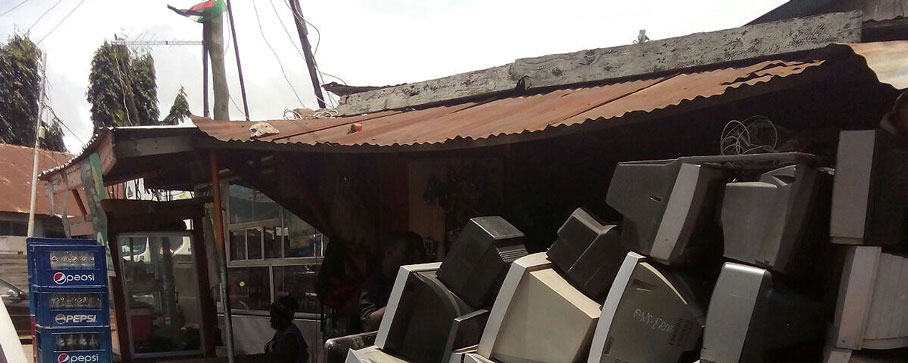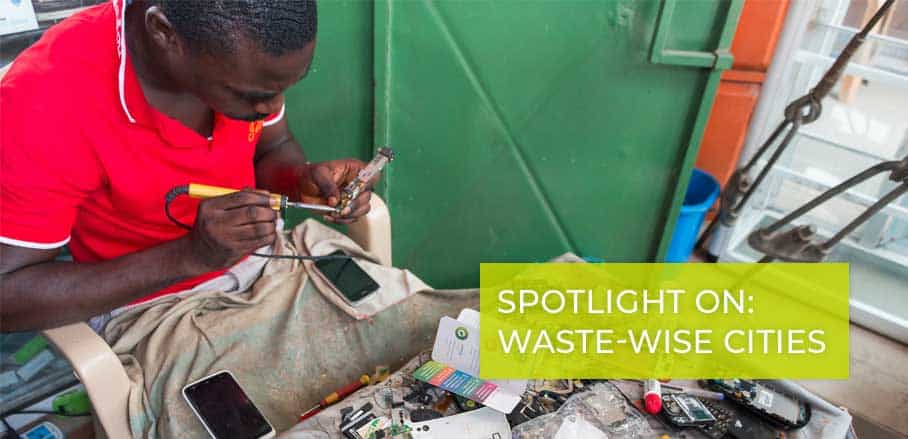Importing Used Electronics from Developed Countries to Nigeria: Problems and Solutions
While Nigeria has made a leap in access to information communication technology (ICT) and the Internet in the past two decades, many of its residents still depend on imported used electrical and electronic equipment (UEEE). Since many of them turn out to be waste electrical and electronic equipment (WEEE), they worsen the challenge of electronic waste management. Prof. Oladele Osibanjo and Dr. Innocent Nnorom discuss this trade along with its environmental and human health implications.
ICT Advancement in Nigeria
ICT diffusion has assisted Nigeria in achieving much needed improvements ranging from economic to social changes, education, communication, transportation, and technological advancement. Much has been achieved in teledensity, access to Internet, and access to ICT goods in the last decade. Google recently ranked Nigeria highest in online presence in Africa, above South Africa and Kenya, and among the top three countries in the world that spend time online in search of various goods and services.

Teledensity in Nigeria © Nigerian Communications Commission
ICT advancement has brought with it many advantages: it facilitates access to knowledge and education, participation in socioeconomic activities, and the effective use of ICT in key sectors such as governance, commerce, education, and healthcare. This also played a very important role in the 2019 general elections during which Electronic Voters Register (EVR), Automatic Fingerprints Identification System (AFIS) and Smart Card Reader (SCR) were used.
These technologies helped reduce electoral malpractices including multiple voter registration and multiple voting. Video recordings of voting processes using mobile phones and sharing of such through the social media also contributed in checking electoral malpractices. The electoral body (INEC –Independent National Electoral Commission) also provided an app (myINEC) to enable the electorate monitor events and developments at INEC.
Electronic commerce is flourishing, reaching from Internet banking, and online hotel reservations to flight bookings delivered by telecommunication. Digital development has created green jobs, employment opportunities, and catalysed poverty alleviation.
The Flows of Used Electronics
Another reality of these developments is that, while demand is increasing, less than 20 per cent of Nigerians can afford the price of new electronic devices. Many still rely on cheap used electronics imported from developed countries. These make up a significant portion of Nigerian imports.
A recent study showed that about 60,000 tonnes of UEEE were imported to Nigeria per year via the ports of Lagos in 2015 and 2016, often mixed with household goods and electronic waste (e-waste) (Insert Fig 2). The major sources of UEEE imports are China (23 per cent), followed by the United States (21 per cent), Spain (11 per cent), the United Kingdom (9 per cent), the UAE and Morocco (4 per cent), Malaysia, Germany, Belgium, and Hong Kong (around 3 per cent each).

UEEE imported into Nigeria, mixed with household goods © Oladele Osibanjo, Innocent Nnorom
Government Attempts to Control Used Electronics
The import of UEEE mixed with e-waste from developed countries is worsening the e-waste scenario in Nigeria. Electronic wastes contain toxic materials such as lead, mercury, cadmium, and brominated flame-retardants (BFRs), which pose occupational and environmental health threats. Informal recycling of e-waste is common in Nigeria, the crude reprocessing is polluting the environment and exposing the population to a cocktail of toxins.
In 2011,the Nigerian government issued both a regulation and legislation to ensure environmentally sound management (ESM) of e-waste and to restrict the importation of WEEE. The legislation also banned the importation of devices containing cathode ray tube (CRT). These are known to be highly polluting since they contain large quantities of lead, making recycling very difficult. The CRT devices, especially televisions, end up at repairers’ shops and are disposed in dumpsites from there.
The Problems – E-Waste and Environmental Pollution
Unfortunately, despite these regulations, the inflow of WEEE items has continued unabated. Generally, the condition of imported UEEE is not known to the Nigerian Port Authorities and Customs, as goods are imported without prior functionality test at the country of origin. Consequently, some imported UEEE are never used. They are either abandoned at a repairer’s shop or dumped at open spaces before valuable material can be collected from them.
Neither the infrastructure for efficient e-waste take-back nor environmentally sound recycling that would protect humans and the environment were existent until recently. Informal e-waste recycling has long been observed as a source of environmental pollution, but the entailing health risks are only just being understood in detail. E-waste is a health risk to critically exposed informal sector workers and persons living close to dumpsites.

Unrepairable imported used electronics abandoned at a workshop © Oladele Osibanjo, Innocent Nnorom
The Way Out
Private companies such as Hinckley and E-terra have taken up the infrastructure deficit challenge in the country, and increasing quantities of e-waste are now properly managed. The government has enhanced the promotion of ESM of e-waste with the adoption and implementation of Extended Producer Responsibility (EPR) in 2014 which is based on polluter pays principle, including ‘Take Back Schemes’ that are backed by legislation. Also, the government has recently adopted a Circular Economy model, which would further strengthen ESM of e-waste and stimulate private sector investment in infrastructure for e-waste recycling.
Domestication of the Basel and the Bamako Conventions into national laws and their enforcement along with extant relevant national laws would minimise illegal import of WEEE. Capacity building of regulatory authorities (including staff of the Ministry of Environment, Customs and Ports Authorities) is also important, as is exchange of information between authorities in Nigeria and those in the developed countries from where the WEEE imports originate. At present, this is infrequent on generally non-existent.
Enforcement of Basel Convention at the country level bans export of waste to developing countries from developed countries; except the Prior Informed Consent (PIC) procedure is activated.
Not the least, awareness raising and constant advocacy among stakeholders, including the informal sector, policy makers, and the political class, are important to guarantee the success of the various measures indicated above.
